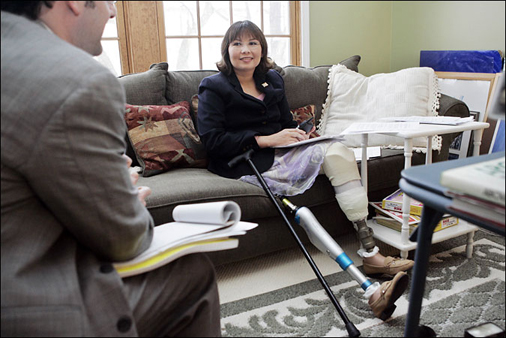
People assume that paying insurance premiums means insurance coverage for medically necessary care will be covered. Think again. Many amputees face the frightening reality that insurance companies can arbitrarily decide to limit or exclude coverage for prosthetic devices. The 2007 November/December issue of inMotion magazine, a publication of the
Amputee Coalition of America, takes a look into this disturbing insurance trend and the solution: creation of prosthetic parity bills.
In a national survey recently completed, proponents of prosthetic parity found that insurance coverage limitations for prosthetic care are severe and far reaching. According to the
Amputee Coalition of America, 29 percent of survey respondents have experienced a reduction in coverage for
prosthetics. Even more alarming, 8 percent of respondents have experienced total elimination of coverage for these necessary devices. Limitation descriptions may include dollar amount limits per year or lifetime and exclusions for certain components, such as microprocessor controlled
prosthetics. Insurance companies adhere to these limitations despite obvious medical need and physician orders.
In order to create laws that ensure medically necessary prosthetic coverage for amputees, the
Amputee Coalition of America initiated a national crusade, one state at a time. Since 2006, the movement for prosthetic parity has made impressive progress. 26 states are now in the process of developing bills to ensure prosthetic coverage, and more states will be following the lead. Thanks to successful efforts by professionals in the prosthetic industry, as well as amputees, legislators are becoming more aware of the importance of prosthetic coverage. Aside from the basic injustice of these limitations, they also can actually increase long-term medical costs by causing amputees to remain less active and more dependent.
The goal now is to continue state campaigns while advancing federal legislation to ensure congressional security. With a national bill, all private insurance companies will be affected, particularly insurance plans that only fall under federal jurisdiction. Amputees will finally rest assured that necessary prosthetic care will be covered, as long as it is medically necessary.
To get involved in the congressional campaign to ensure insurance coverage for prosthetic devices, contact the Advocacy Team at appll@amputee-coalition.org. More information on prosthetic parity bills can be found at www.amputee-coaltion.org/advocacy.